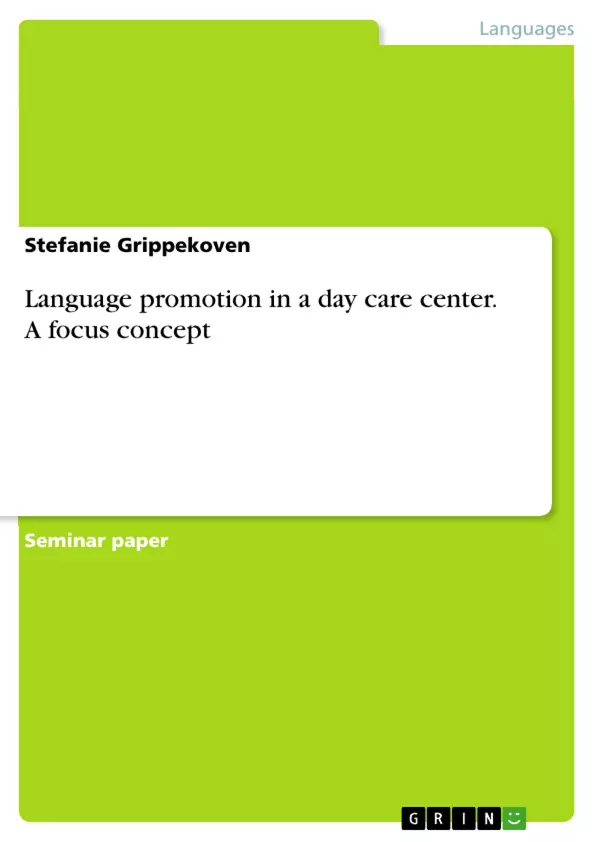This seminar paper contains a complete focus concept on the topic of language promotion using the example of a daycare center. Name, place as well as photos were of course removed for data protection reasons. After this concept, the work is concluded with a justification section on the topic of language and language promotion.
Inhaltsverzeichnis (Table of Contents)
- Our daycare center..
- We introduce ourselves
- Our image of the child..
- Why language support?.
- The circle of addressees
- The role of pedagogical professionals.
- Everyday integrated language support.
- Intercultural language promotion.
- Implementation of language support..
- Project work
- The importance of music.
- Objectives of language promotion
Zielsetzung und Themenschwerpunkte (Objectives and Key Themes)
This document presents a comprehensive concept for language promotion in a daycare center. It outlines the importance of language support for children, particularly those from migrant backgrounds, and aims to provide a framework for educators to implement effective language development strategies.
- The importance of language support for early childhood development.
- The role of educators in creating a supportive and stimulating language environment.
- Strategies for promoting language skills through everyday activities and project work.
- The significance of intercultural language promotion and inclusivity.
- The benefits of music and other creative activities for language development.
Zusammenfassung der Kapitel (Chapter Summaries)
- Our daycare center: Introduces the daycare center, its location, and its commitment to multiculturalism. It emphasizes the importance of providing a nurturing and stimulating environment for children's development.
- Our image of the child: Defines the daycare center's philosophy of viewing each child as an individual with unique strengths, interests, and cultural backgrounds. It underscores the importance of respecting and valuing each child's individuality.
Schlüsselwörter (Keywords)
The key focus areas of this document are language support, early childhood development, intercultural education, pedagogical practices, and the role of educators in fostering language skills in a diverse environment.
Frequently Asked Questions
What is everyday integrated language support?
It refers to the practice of promoting children's language skills through natural interactions and activities during the normal daily routine of a daycare center, rather than in isolated lessons.
Why is language promotion critical in early childhood?
Language is a key factor for cognitive development, social integration, and future educational success, making early support essential for all children, especially those from diverse backgrounds.
What is the role of pedagogical professionals in language development?
Educators act as language role models, creating a stimulating environment and using specific strategies to encourage children to express themselves and expand their vocabulary.
How can music support language learning?
Music, songs, and rhythms help children learn sentence structures, improve pronunciation, and memorize new words in a playful and engaging way.
What does intercultural language promotion involve?
It involves valuing and integrating the different home languages and cultural backgrounds of children into the daycare environment to foster inclusivity and confidence.
How is project work used for language support?
Projects allow children to engage deeply with specific topics, encouraging them to communicate, ask questions, and use language in various meaningful contexts.
- Arbeit zitieren
- Stefanie Grippekoven (Autor:in), 2009, Language promotion in a day care center. A focus concept, München, GRIN Verlag, https://www.grin.com/document/1169240



